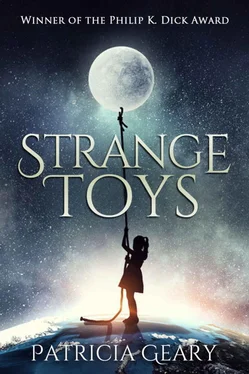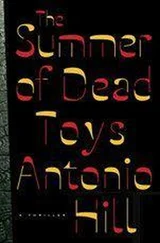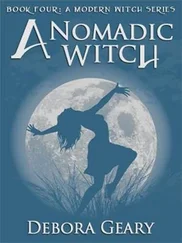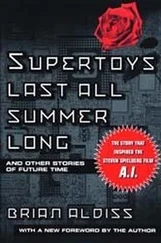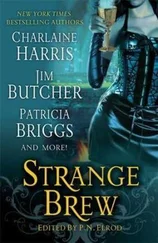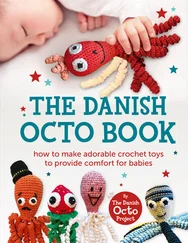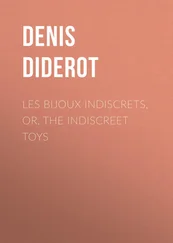From their black satin case I extract my thirteen precious stones. Yet another talisman I have made up in order to read the weather in the Other World. They sit in my palm like a still pond, and then they seem to glow softly, an electric appliance warming up. The rose quartz brightens first.
The Apache tear is next.
What do they mean? You can never know for sure, but this is a new sequence for me. The stones, like so much else in your life, are a language half-remembered from childhood, lost to the adult mind yet yearning in the heart.
The Apache tear, of course, is to remember Alonso.
The third stone to go bright is pale green, picked up from Jade Beach near Big Sur. It is transparent as lettuce.
Pink. Black. Green. Whatever— I return them to their satin bag. As I leave the restroom, something catches the corner of my eye: a tiny goblin, hovering in another dimension of the air? But when you look directly, natch, you come up with one big goose egg.
* * *
Barnett is busily snarfing down the bourbon. Who knows how many drinks can have passed?
“I got me some cheese comin, and some of that Frog stuff, pat-tay? What you want, darlin?”
“A crab cocktail please.” The gimlet, the shade of celadon and also the third stone, sits before me.
“Gotcha.” Barnett effects the order.
The first sip is for courage, and the sweet lime with its poisonous vodka tastes pretty good. I lean close to Barnett, seeing my own earnestness reflected in his even gray eyes. “What do you really want?”
He leans back, pleased.
I lean back, expectant.
“Let me tell you a story,” he says, making a steeple of his fingers. The red hair shines like earthly gold in the candlelight.
Our waiter plops down a plate of Brie and pâté for Barnett and a luscious mound of snow-white crab for me. It sits in a crystal goblet, surrounded by shaved ice. The first bite is tender as butter.
“Two boys grew up out in the swamp. I mean, swamp . And I mean way way out, where you never been.”
“How do you know that—”
“Honey, you ain’t.”
That voice convinces you.
He dips his knife into the soft cheese, its sweet and slightly ammoniac smell. “We’re talking thirty, forty years ago. No school, cuz them schools didn’t even know these boys existed . Lotsa kids like that still. Ain’t nobody can navigate them swamps less they was born to it. Out to Whiskey Bay—” He stops, mischievous. “Why, your people musta been from there.”
“I’m from California.” At least the crab is delicious.
“Anyways. Them kids grew up a-ridin they boats through the bayous, a-rasslin with they gators….”
“Look.” I put down the tiny fork. “Do you think you could tone it down a bit?”
“ Avec plaisir, mademoiselle .” The accent is impeccable, and for an instant, in the hook of his smile, you would swear we understood each other. Precisely.
And then the feeling fades.
“What they discovered is this: they discovered a place in the swamp, kind of a doorway, where you could get through to someplace else.”
“What do you mean, someplace else ?” More gimlet is in order.
“I mean, like a different world.”
Well, it would be hypocritical of me to be surprised. Here we go again. The only surprising part, perhaps, is that you get results this quickly. This afternoon I lifted a thousand pounds; for the third time in my life, I am being offered another way. This time, I am ready.
On that note, we both polish off our appetizers in silence. When the waiter removes our plates, we order more drinks and our entrées: veal with artichokes for me and duck in a raisin glaze with candied yams for Barnett.
Even though this red meat isn’t technically red, it’s my first in years. If you are going to pollute the temple, why, then, just do it.
“A world peopled with different creatures,” he continues when we are alone again. “But it’s transparent. You can look right on over to this world the same way you’d watch fish in an aquarium.”
Suddenly I glance to my left, where moments before there was a wall. The wall is still there, of course, but it shimmers oddly, less than a wall. Then it seems something is about to happen, happen—and then nothing does.
The wall is a wall.
Nicotine, caffeine, alcohol. Coming up: red meat and sugar.
“So every day they could, these two boys would paddle their pirogue—I done forgot to tell you about the pirogue!”
Slipping back into cracker.
“Well, they built themselves a dugout, just like the ones them Asmat Indians use to visit their ancestors. I don’t mean one of them ‘soul ships’—the kind’s got no bottom? With them carved figures and the tortoise in the center?”
Wait just one minute. Are we in a dream now? Here is stoptime déjà vu, the effect they claim is merely caused by an overeager brain, even though it makes the world go wrinkley and then smooth, as though someone were shaking out a huge bolt of gray shot-silk. Does anyone in the world believe the scientific explanation?
“Anyways, those boys had an Asmat pirogue and they wore them masks. The ones that cover the body entirely, kind of a hood? They got a feathered rod protruding from the head and wooden eyepieces. The heads was huge black whatjacallits? Cockatoos.”
Irrevocably, he’s sucked me in, into the mystery of the swamp, the story of a carved canoe decked out in twine and feathers. “This was in Louisiana,” I point out. “How did these boys, who never went to school, know anything about headhunters in New Guinea?”
Barnett looks triumphant. “I didn’t say they didn’t have no books!” He snaps his fingers for the waiter and orders a white Bordeaux, once again employing his exquisite French.
I chug the last sip of my second gimlet.
“So off they’d go,” he continues. “And one of the best parts is how they could stay in this other world, oh, days, but when they got back to this world, why, nothing had changed.”
He wipes his mouth and leaves the napkin in a crumple on the table.
“Scuse me,” he says. “Be right back.”
Obviously, he’s gone to the men’s room, all that bourbon. I think about lighting a cigarette but then he’s already back.
He hands me a two-foot wooden item. Very heavy. Then he sits back down.
The object is made of dark wood, its center section a lozenge-shaped openwork. At either end of the lozenge is a head, carved in peculiarly intricate detail. You don’t need much imagination to see that one of the heads is Barnett’s and the other one is mine.
He points a delicate finger at the geometric lattice. “This is a stylization of the intricate root pattern of the holy banyan tree.” Sounding for all the world like an effete anthropologist.
“But the heads—”
“You and me.”
I stare at the wooden carving, which is warm to the touch.
“I went on over there and told them what we wanted. Then there was a wait while they carved it, of course. Since it’s ironwood, it took them a couple days. But I ate well and rested a lot.”
“You went on over where ?”
“To the other world, of course.”
“Oh, of course.”
“Never mind.” His gray eyes are kind. He takes his napkin and dips it in ice water, placing the cold compress on my forehead. He smells like suntan oil. “Just lean your head down now.”
“I’m not used to alcohol. I guess—”
The cool napkin, the reassuring hands. “Feel better?”
“Yes, thanks.” I sit up again and the room has cleared a bit, the air not red and ugly, as it was threatening to go.
The statue is still on the table, plain as day. Part of me says, He must have gotten someone to carve it before he met me for dinner. He’s been watching me for weeks . But the other part, the better part, of me Believes.
Читать дальше
